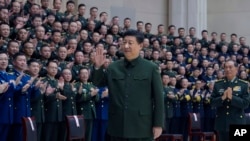A group of prominent Australians including former politicians, diplomats and academics have called on the government to adopt "an activist middle power role" to avert U.S.-China conflict.
A group of high-profile Australians Wednesday called for the government to take action to head off conflict between the United States and China. The group, led by former Australian foreign affairs ministers Bob Carr and Gareth Evans, said in a statement that without a "comprehensive new détente," tensions between the United States and China could escalate into a conflict that could involve Australia.
Fifty prominent Australian public figures, including former state government premiers, diplomats, writers and academics have called on the government to act as an intermediary to defuse tensions.
The group said it supports "a balance of power in the Indo-Pacific region in which the United States and China respect and recognise each other as equals."
It added that if "neither side demands absolute primacy" the risk to "global peace and prosperity" would be reduced. There has been no official comment so far from Washington or Beijing on the declaration.
China is Australia’s biggest trading partner. The center-left government of Australian Prime Minister Anthony Albanese has stabilized relations with Beijing after years of disagreement and distrust over various geopolitical and trade disputes, including China’s ambitions in the Pacific and the origins of the COVID-19 pandemic.
Australia also has deep-seated security links to the United States dating back to the early 1950s.
Carr told the Australian Broadcasting Corp.that Australia has the opportunity to act as an honest broker between the United States and China.
"Australia’s role is to plant the notion of greater collaboration and less adversarial talk in the relationship,” he said. “Taiwan, the most challenging diplomatic question here, provides a perfect opportunity of diplomatic language being an alternative to a descent into conflict and argument that could give rise to war."
The Australian government has previously conceded that there will be differences and difficulties in its bilateral relationship with China.
The government is pushing ahead with plans to acquire nuclear-powered submarines under the AUKUS accord with the United States and Britain.
Analysts say that China’s increasing assertiveness is a key motivation behind the trilateral AUKUS agreement, but China has accused the three countries of a "Cold War mentality," saying the alliance was embarking on a "path of error and danger."




